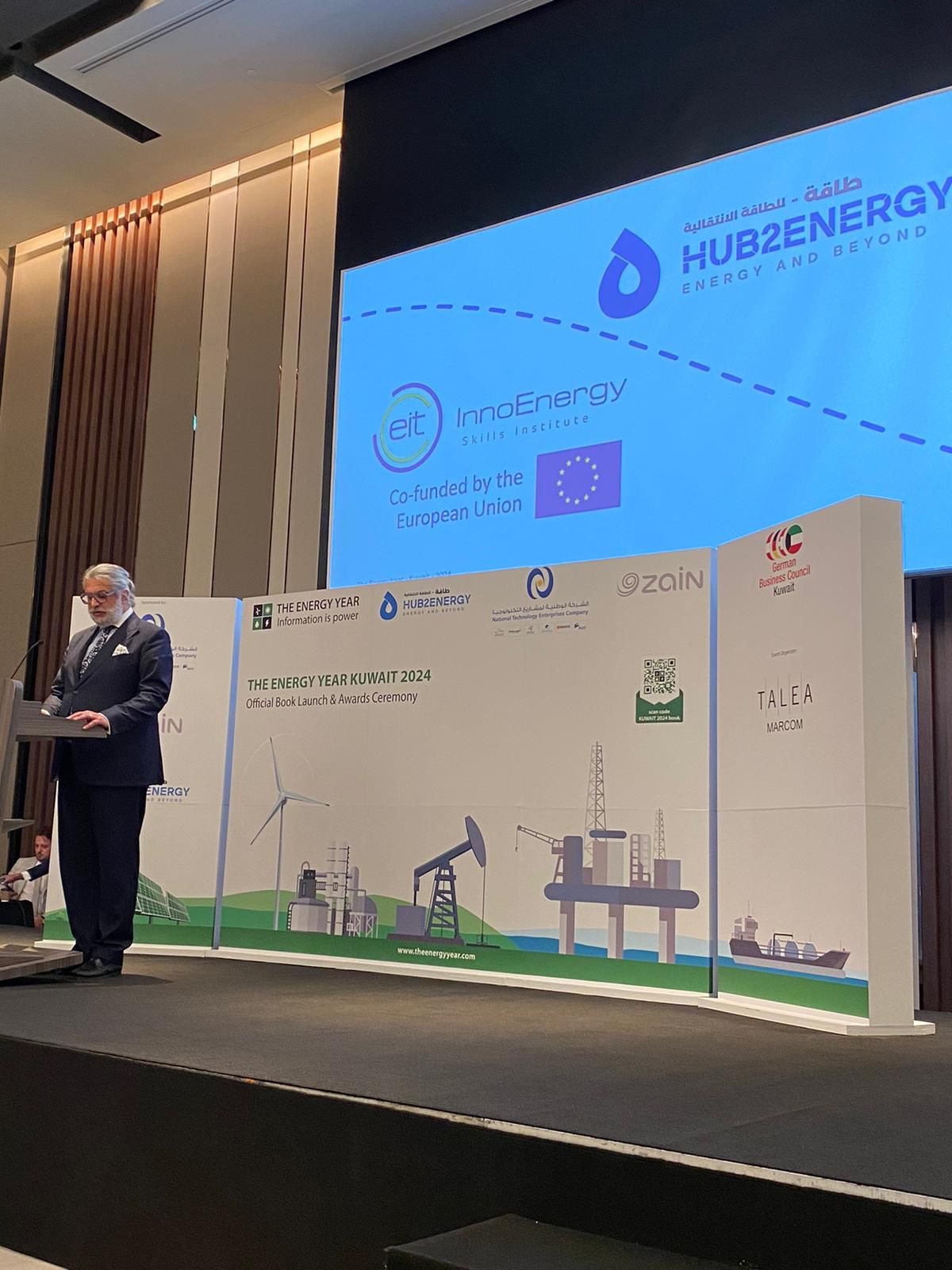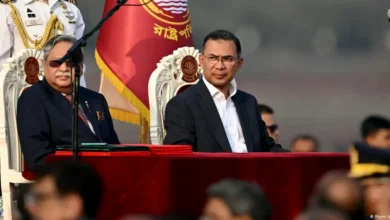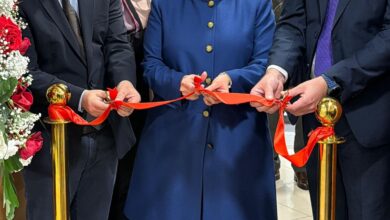Hub2Energy CEO unveils bold vision for Kuwait’s energy future
António Azevedo Campos highlighted the need to integrate fossil fuels and renewables to meet rising energy demands while minimizing environmental impact.

• António Azevedo Campos, co-founder and CEO of Hub2Energy, emphasized that Hub2Energy’s approach is balanced and said “boosting oil production alongside renewables, hydrogen, CCS, and CCUS is essential for creating a low-carbon and sustainable economy.”
The Energy Year hosted its book launch and awards ceremony for The Energy Year Kuwait 2024 on October 9 at the Grand Hyatt Kuwait. Keynote speeches were delivered by Bader Al-Attar, Managing Director for Planning & Finance at KPC, and Anwar Al Mutlaq, Country Chair of Shell Kuwait. National Technology Enterprises Company, Hub2Energy, and Zain Kuwait also presented their visions for the energy sector.
After the event, António Azevedo Campos, co-founder and CEO of Hub2Energy, shared his ambitious vision for Kuwait’s energy future. He highlighted the need to integrate fossil fuels and renewables to meet rising energy demands while minimizing environmental impact.
During the event, António emphasized that Hub2Energy’s approach is balanced: “Boosting oil production alongside renewables, hydrogen, CCS, and CCUS is essential for creating a low-carbon and sustainable economy.” While advocating for the use of all energy resources, Antónioalso stressed that technologies must work together to meet energy security needs and advance climate goals.
António explained that Hub2Energy’s strategy is built on three foundational pillars: Decentralize, Digitalize, and Decarbonize.
“Decentralizing focuses on bringing energy production closer to consumers by implementing renewable energy, microgrids, and energy storage solutions. By decentralizing energy systems, we increase resilience and efficiency,” António said, highlighting the shift from large, centralized grids to localized, more sustainable energy networks.
He also highlighted Hub2Energy’s digital transformation efforts, stating that digitalizing energy is key to efficiency. The technologies, built on a cloud-based system powered by AI, Deep Learning, and Digital Twin technologies, aim to provide real-time insights and operational control.
António explained that by using advanced simulations, real-time monitoring, and predictive maintenance, they can achieve 100% accuracy, reduce costs, and optimize energy output while minimizing emissions. For example, in grid operations, AI-driven analytics and dynamic line ratings ensure the reliability of transmission and distribution networks. “It helps prevent overloads and supports the integration of renewable energy sources. These solutions directly address the critical energy challenges Kuwait recently faced, such as outages, power failures, and the grid reaching its limit.”

In the Oil & Gas sector, Digital Oil Field technologies enable remote visualization, turnaround management, and AI-driven safety solutions. All of these improve operational efficiency and further reduce emissions.
António shared that Hub2Energy has already secured the capital to launch a pilot project in Kuwait using these technologies to optimize both grid operations and oil & gas assets. This pilot is set to demonstrate the technologies’ ability to provide immediate, scalable solutions to Kuwait’s energy challenges.
António underscored Hub2Energy’s commitment to reducing carbon emissions across all industries, not just electricity. By deploying solutions such as CCUS, Power-to-X, cavitation, hydrogen, green ammonia, filtration, and e-fuels, Hub2Energy’s ambition is to decarbonize the industrial sector, including hydrocarbon production. “We have the know-how and partners to help achieve that mission,” António said, emphasizing the critical role of global collaboration in advancing technological breakthroughs.
Hub2Energy’s global network connects the company with some of the brightest minds and most advanced technologies worldwide.
In addition to technological innovation, António stressed that the right skills are at the heart of any transformation. During the Energy Year book launch event, he announced Hub2Energy’s partnership with the InnoEnergy Skills Institute, co-funded by the European Union and supported by the European Institute of Innovation and Technology. “This partnership aims to accelerate the development of new skills and competencies across the energy value chain in Kuwait and the GCC.”
António proudly shared the Skills Institute’s goals, along with a message from Oana Penu, president of the InnoEnergy Skills Institute, emphasizing the importance of building a skilled workforce capable of managing advanced energy systems. “Technology alone is not enough,” António said. “We need skilled professionals who can operate and maintain these systems, ensuring their long-term success.” He added humorously, “We can’t skip people.”
“Despite the challenges posed by regulatory frameworks and market conditions, Campos remains optimistic about the future of Kuwait’s energy transition. He views Public-Private Partnerships (PPP) as a crucial mechanism for financing large-scale infrastructure, decarbonizing solutions, and emerging technologies, fostering collaboration between the government and industry. Campos emphasized that collaboration is key, noting that Hub2Energy advances these solutions through partnerships with international leaders such as Enline, Zynq, VentilAQ, and Wavelength. These global partnerships enable Hub2Energy to implement proven solutions for optimizing grids, enhancing oil and gas operations, reducing industrial water waste, and advancing decarbonization technologies in Kuwait and the GCC.”
“In his concluding remarks, António expressed optimism about the future: ‘The energy transition is not just about switching energy sources or adopting new technologies—it’s about making all forms of energy work together to empower people, reduce emissions, and foster long-term energy growth for the benefit of a low-carbon economy. We adopted the circular carbon economy framework as a path toward achieving Net Zero.’
He also took a moment to congratulate Wadha Ahmed Al Khateeb, CEO of KIPIC, for being named Person of the Year, recognizing her impactful leadership in the energy sector. António highlighted the importance of gender equity in energy, noting the significant contributions of women in driving innovation and sustainability. He emphasized that ‘the energy transition will benefit from the talents of individuals across all genders.”

“In closing, António expressed optimism about the future: ‘The energy transition is not just about switching energy sources or adopting new technologies—it’s about making all energy forms work together to empower people, reduce emissions, and foster long-term energy growth for the benefit of a low-carbon economy. We have adopted the circular carbon economy framework as a pathway to Net Zero.’
He also congratulated Wadha Ahmed Al Khateeb, CEO of KIPIC, on being named Person of the Year, acknowledging her impactful leadership in the energy sector. António emphasized the importance of gender equity in energy, noting the significant contributions of women in driving innovation and sustainability. He stated, ‘The energy transition will benefit from the talents of individuals across all genders.'”
He further emphasized the invaluable opportunity to network with leaders from Kuwait’s energy sector, as well as key decision-makers from both the private and public sectors. António acknowledged the critical work done by The Energy Year in promoting the event and curating the book edition, which, in his words, includes ‘all the ingredients needed for sustainable energy and the future of Kuwait’s economy. Energy can’t skip Kuwait.'”
Decentralizing focuses on bringing energy production closer to consumers by implementing renewable energy, microgrids, and energy storage solutions. By decentralizing energy systems, we increase resilience and efficiency,” António said. António highlighting the shift from large, centralized grids to localized, more sustainable energy networks.













